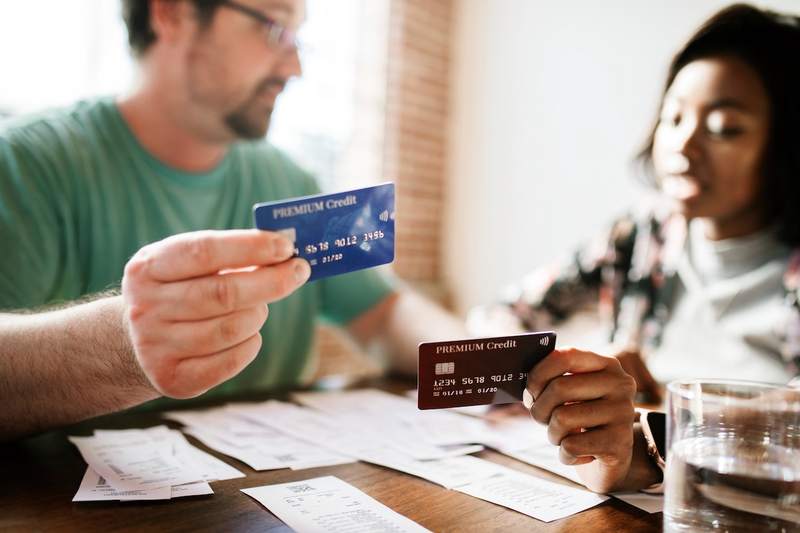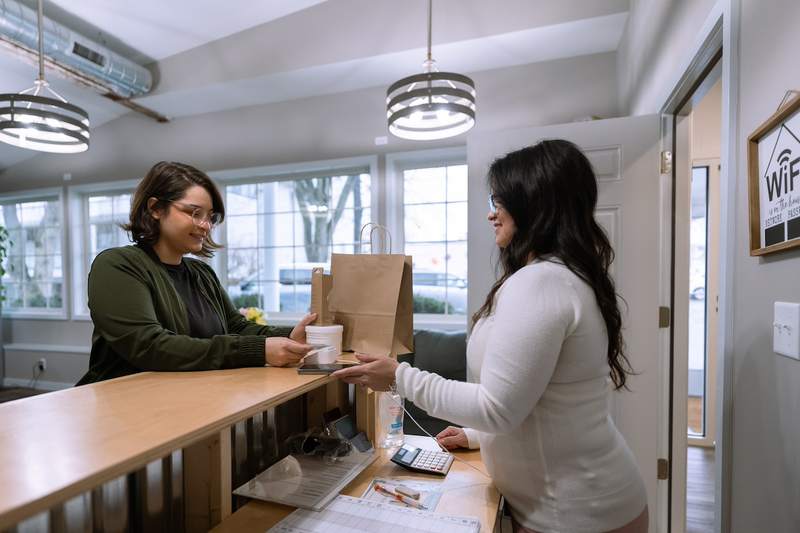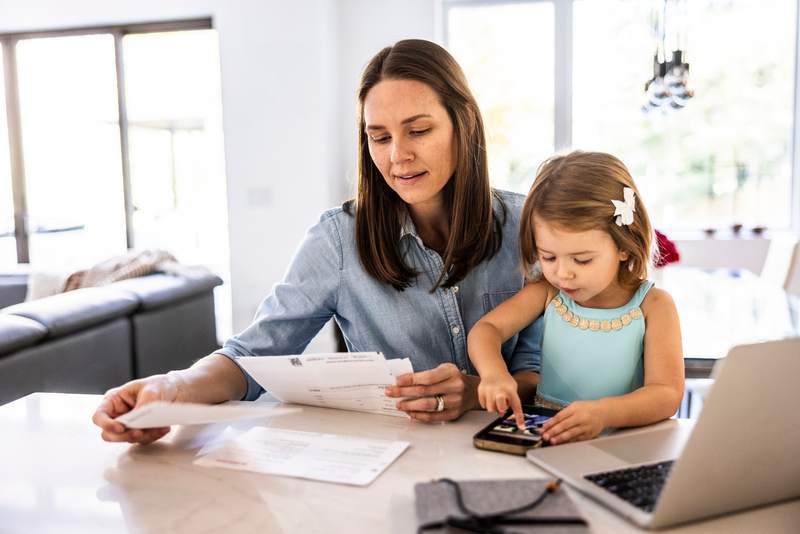Although U.S. households carry over $7,950 in credit card debt on average, according to data from the Federal Reserve Bank of New York, many Americans lack a solid plan for paying off their credit cards. If you want to pay off your credit card debt as soon as possible, though, one option you might explore is taking out a personal loan and consolidating your debt into a single payment.
Since personal loans have different features than credit cards, paying off your credit card debt with the funds from a personal loan may help you save money, enjoy easier budgeting and reduce your monthly payments.
Now, let’s take a closer look at the practice of using a personal loan to pay off credit cards.
When Is It Wise To Pay Off Credit Cards With A Personal Loan?
Paying off credit cards with a personal loan can be a smart financial decision, but only if the benefits align with your goals. It might make sense to pay off your credit card debt with a personal loan if you want a lower interest rate, a fixed interest rate and predictable monthly payments, lower monthly payments or a single monthly payment.
Next, we’ll break down each of these possibilities.
A Lower Interest Rate
A personal loan will often have a lower interest rate than a credit card if you have good credit. For example, if you have $5,000 in credit card debt and a 20% interest rate, you could pay $1,000 in annual interest charges alone. If you take out a $5,000 personal loan with a 12% interest rate, your annual interest would be $600, saving you $400 in 1 year compared to the credit card.
A Fixed Interest Rate And Predictable Payments
While credit cards typically feature a variable interest rate, personal loans usually have a fixed interest rate and predictable monthly payments. If you want to simplify budgeting and know exactly when you’ll pay off your debt, a personal loan may make sense for you.
Lower Monthly Payments
The length of a personal loan often ranges from 2 – 7 years. Credit card debt, on the other hand, is revolving, which means you can continue borrowing and accumulating interest for as long as you wish to keep the card active and are able to pay off your charges. While your monthly payment could continue to grow with a credit card, a personal loan has a set repayment period that involves making equal monthly payments over several years. This could translate to lower monthly payments than you’re making on a credit card.
A Single Payment
When you want the convenience of a single monthly payment, you can apply for a personal loan to consolidate credit card debt. With debt consolidation, you can take monthly payments on multiple credit cards and roll them into one loan with one payment each month.
What’s Your Goal?
Buy A Home
Discover mortgage options that fit your unique financial needs.

Refinance
Refinance your mortgage to have more money for what matters.
Tap Into Equity
Use your home’s equity and unlock cash to achieve your goals.
Benefits Of Using A Personal Loan To Pay Off Credit Cards
Using a personal loan to pay off credit card debt comes with several benefits – which we’ll review next – that can save you money, simplify your finances and help put you in a better overall financial position.
A Potentially Lower Interest Rate
Credit cards are known for having high interest rates, which can cost you thousands of dollars in interest charges each year if you only make the minimum monthly payment. While the interest rate of a personal loan depends on your creditworthiness, personal loans tend to have a lower interest rate than credit cards.
Debt Consolidation
Keeping track of your credit cards and making your monthly payments on time can be challenging if you have multiple accounts. Consolidating your credit card debt into a personal loan makes it easier to manage your finances and take care of one monthly payment at a time instead of making multiple payments each month.
A Possible Boost To Your Credit Score
Your credit score is based on several factors, including your credit utilization ratio. If you carry high balances on several credit cards, your credit utilization ratio will be higher, which can negatively impact your credit. When you consolidate your credit card debt into a personal loan, it could result in a lower credit utilization ratio and a higher credit score.
Ready To Become A Homeowner?
Get matched with a lender that can help you find the right mortgage.
Drawbacks Of Using A Personal Loan To Pay Off Credit Cards
Paying off credit cards with a personal loan may help you get out of debt sooner in certain situations, but you’ll still need to consider the potential drawbacks of this practice.
High Fees
Personal loans tend to have high fees, often totaling 1% – 6% of the loan amount. While the personal loan fees you’ll incur will depend on your lender, they may include application fees, origination fees and prepayment penalties. These fees, when handed out, are in addition to the interest rate charges and any late fees or payment processing fees the lender might charge.
No Guarantee Of A Lower Interest Rate
Though many borrowers will enjoy a lower interest rate on a personal loan than they would have on credit cards, it’s never guaranteed. In rare cases, the interest rate on a personal loan may actually be higher than that on a credit card.
The Possibility Of Needing A Higher Credit Score And Income
To qualify for a more competitive interest rate, you may need a higher income and a higher credit score. If your credit score could use some work, a lender might opt not to offer you an attractive interest rate, or they might even deny your personal loan application altogether. Many lenders require a credit score of 670 or higher before they’re willing to extend a competitive interest rate and loan length.
The Potential For Overspending
Clearing your credit card debt by taking out a personal loan won’t necessarily prevent you from overspending on your credit card in the future. If you’ve paid off your credit card debt with a personal loan, you might be tempted to start making purchases with your credit card. And, if you’re not careful, you could end up with new credit card debt plus your monthly personal loan payment.
Take The First Step To Buying A Home
Find a lender that will work with your unique financial situation.
How To Pay Off Your Credit Card Using A Personal Loan
Now that we’ve examined the advantages and disadvantages of using a personal loan to pay off credit card debt, let’s walk through seven steps involved in the process of actually going about this.
1. Calculate How Much You’re Paying In Credit Card Interest
Before you decide to take out a personal loan to pay off your credit cards, figure out exactly how much you’re paying in credit card interest. This way, you’ll have a clear understanding of how much money a personal loan could help you save.
2. See If It’s Worth Paying Off Credit Card Debt With A Personal Loan
Sometimes, taking out a personal loan to pay off credit cards isn’t worthwhile. Consider the interest rate on your loan and whether it’ll save you money on interest payments. Also, remember to factor in additional personal loan costs, such as an origination fee.
Consider your long-term goals and determine whether consolidating your credit card debt into a personal loan will help improve your financial position as a whole.
3. Submit A Personal Loan Application And Required Documentation
To get a personal loan, you’ll need to submit a loan application, which will ask for some personal and financial information. You may need to submit proof of income, tax returns and details about your assets and any existing loans you have.
This information helps the lender evaluate your creditworthiness and verify that you are who you say you are. In other words, lenders want to know that you’re going to hold up your end of the deal and pay back the money you borrow in a timely manner.
4. Use The Personal Loan Funds To Pay Off Credit Card Debt
If you’ve determined it makes sense to take out a personal loan to pay off your credit cards, the next step is to pay your credit card bills using the funds from your personal loan. Since a personal loan provides a one-time lump-sum payment, you can pay off the full balance of all your credit cards immediately as long as the sum of your personal loan exceeds your credit card balances.
5. Make Your Monthly Personal Loan Payments On Time
Now that you have a personal loan payment each month, it’s important to make that payment on time, every time. Making on-time payments will help you avoid late fees, and it’s one of the most important components of your credit score.
6. Consider Paying Off Your Personal Loan Early
If you have the money to pay off your personal loan ahead of schedule, you’ll be wise to do it. While the interest rate on your personal loan might be lower than the interest rate on your credit cards, paying off your loan sooner will allow you to save even more in interest.
7. Continue Using Your Credit Card Responsibly
Getting rid of your credit card debt doesn’t mean you need to stop using credit cards altogether. Credit cards can still have a place in your wallet. Just make sure you avoid overspending, and do your best to pay off your balance in full each month.
Alternative Ways To Pay Off Credit Card Debt
If you decide a personal loan isn’t your best option for paying off credit card debt, consider these alternatives.
Balance Transfer Cards
A balance transfer card lets you consolidate debt from multiple credit cards onto a single credit card so you’ll only have to make one monthly payment and you can potentially enjoy a lower interest rate. While it might seem counterintuitive to pay off credit card balances by opening a new credit card, some balance transfer cards offer a temporary 0% introductory annual percentage rate (APR).
Home Equity Loans Or Home Equity Lines Of Credit
A home equity loan or home equity line of credit (HELOC) is somewhat similar to a personal loan, but it uses your property as collateral to secure the loan. In other words, if you fail to make on-time payments, you could lose your home. These loans typically have strict credit, income and home equity requirements for applicants but often come with a lower interest rate than a personal loan.
Debt Payment Strategies
If you don’t want to take out a new loan, you can use one of at least two debt payment strategies to potentially pay off credit card debt sooner. These strategies, both fairly common, are the debt avalanche method and the debt snowball method.
Here’s a quick breakdown:
- Debt avalanche method: This approach focuses on paying off your highest-interest debt first. Once you pay off your credit card with the highest interest rate, you move to the card with the next highest rate, and so on.
- Debt snowball method: This approach focuses on paying off your smallest debts first, which can help you build momentum for paying off bigger debts down the road.
FAQ
Below are the answers to some frequently asked questions about using a personal loan to pay off credit card debt.
The Bottom Line
Consolidating debt from credit cards into a personal loan can help save you money, streamline your monthly payments and boost your credit score. The benefits of paying off credit cards with a personal loan are accompanied by some drawbacks, though, and there’s no guarantee you’ll be able to qualify for a lower interest rate.
Whether you decide to use a personal loan to pay off credit cards, it’s always important to use them responsibly and pay off your monthly balances in full whenever possible.

Victoria Araj
Victoria Araj is a Staff Writer for Rocket Companies who has held roles in mortgage banking, public relations and more in her 15-plus years of experience. She has a bachelor’s degree in journalism with an emphasis in political science from Michigan State University, and a master’s degree in public administration from the University of Michigan.












